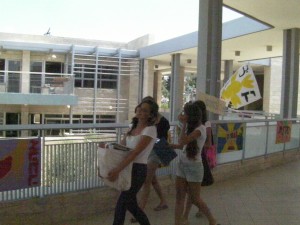Riding the school bus together in Jerusalem
By Khaled Diab
Bilingual Hebrew-Arabic schooling has the potential to build bridges between Palestinians and Israelis. So why aren't there more of them?
Thursday 28 July 2011

The mutual distrust between Israelis and Palestinians is such that almost every action by the other side is viewed through a prism of suspicion. Take the Jerusalem light railway. When it finally starts operating, it will connect the Jewish west of the city with the Palestinian east.
Many Palestinians, concerned over Israel's ongoing settlement expansion, see the new tram not as a useful transportation service but as part of an Israeli plan to cement its grip on the whole of Jerusalem. For many Israelis, the idea of becoming fellow passengers with Palestinians is a prospect that elicits both fear and loathing.
This is partly because, with little personal contact between the two sides, the voices of extremists are the loudest. Avoiding an arrival at this terminal state of distrust is a long journey that should start as early as possible in life. Perhaps persuading Israelis and Palestinians to become fellow passengers on the school bus, so to speak, is one of the biggest challenges facing those who seek a future of coexistence.
The Hand in Hand bilingual education network aims to provide just such an opportunity. Founded in 1997 by an Israeli-American social worker, Lee Gordon, and a Palestinian-Israeli teacher, Amin Khalaf, the network is currently comprised of four schools where Israeli-Jews and Palestinians can study together in both Arabic and Hebrew. The largest school, with some 500 pupils, is in Jerusalem.
In line with the school's aim of promoting complete equality between Arabs and Jews, the children often don't know or care about the ethnicity of their schoolmates. “The children at the school don't look at each other as ‘Jews' and ‘Arabs', they use their own criteria,” explains Ira Kerem, an American-Israeli social worker and my guide for the day. “What they're interested in are things like: is this person good friend material, is this kid cool, how good is he at football?”
“We learn to love people for who they are more than where they come from or what religion they believe in,” writes Ruth, a Jewish pupil, in a letter to an American supporter.
Nevertheless, despite the school's best efforts, inequalities do creep in. In theory, the school's bilingual approach should ensure that all the pupils become equally proficient in Hebrew and Arabic, explains Inas Deeb, who is in charge of educational programmes at the school.
“However, Arab pupils generally speak better Hebrew than Jewish pupils speak Arabic,” says Deeb. “Hebrew is the dominant language… Arab kids speak Hebrew outside the school, unlike most of the Jewish kids [who do not speak Arabic].”
Despite these linguistic disparities, which the school and parents are working to tackle, pupils confirm the general sense of equality and trust. “There's no difference here between the Jewish kids and the Palestinian kids. Unlike outside the school, here we feel equal,” agreed Mu'eed and Jouhan, two Palestinian teenagers studying at the school.
But the reality of the divided city is never far from the school gates. When I probed the youngsters about whether they socialised with their Jewish friends, both answered in the affirmative, but noted that Jewish and Palestinian neighbours were not always as tolerant and understanding.
As its name suggests, Hand in Hand does its best to promote honest and mutually respectful dialogue among pupils and parents alike, says Kerem. “We teach that bloodletting will not resolve the conflict or bring about peace,” adds Deeb.
Although this is commendable, the question of how much difference the few thousand children who have studied at Hand in Hand and other schools like it can make is a poignant one. “We have no illusions that this school will bring peace between Israelis and Palestinians,” one Israeli-Jewish father admitted to me. “But you have to do something and every little bit counts. And you have to start with yourself.”
“This school offers a glimmer of hope for the future, and for the sake of our children, we need to provide them with every bit of hope we can,” his good friend, a Palestinian mother, chimed in.
But to keep this glimmer alight and perhaps help it burn more intensely requires support. Hand in Hand depends for at least a third of its funding on international private donations, which have been hit hard by the global recession. If it fails to raise more funds, it may be forced to cut back its activities.
It is the opinion of this author that not only does Hand in Hand deserve a helping hand, but that this kind of bilingual education should become more universally available in order to help the next generations to learn to live together.
This article was first published by the Common Ground News Service on 26 July 2011.


